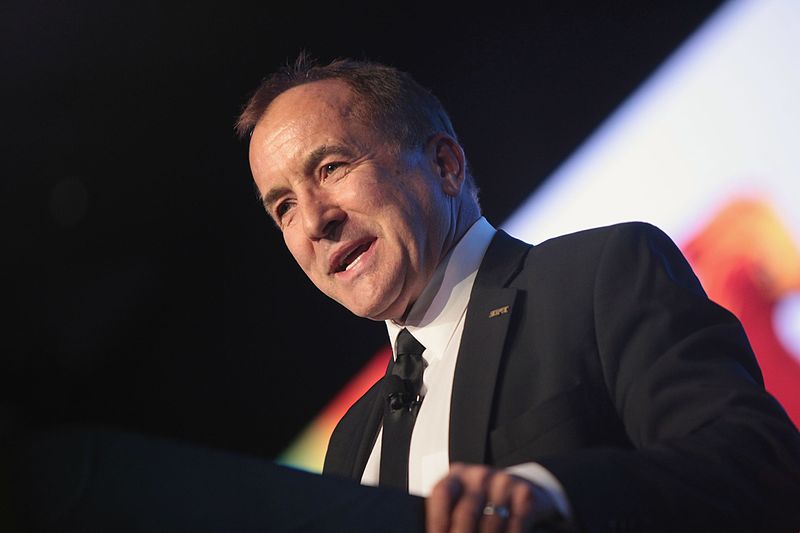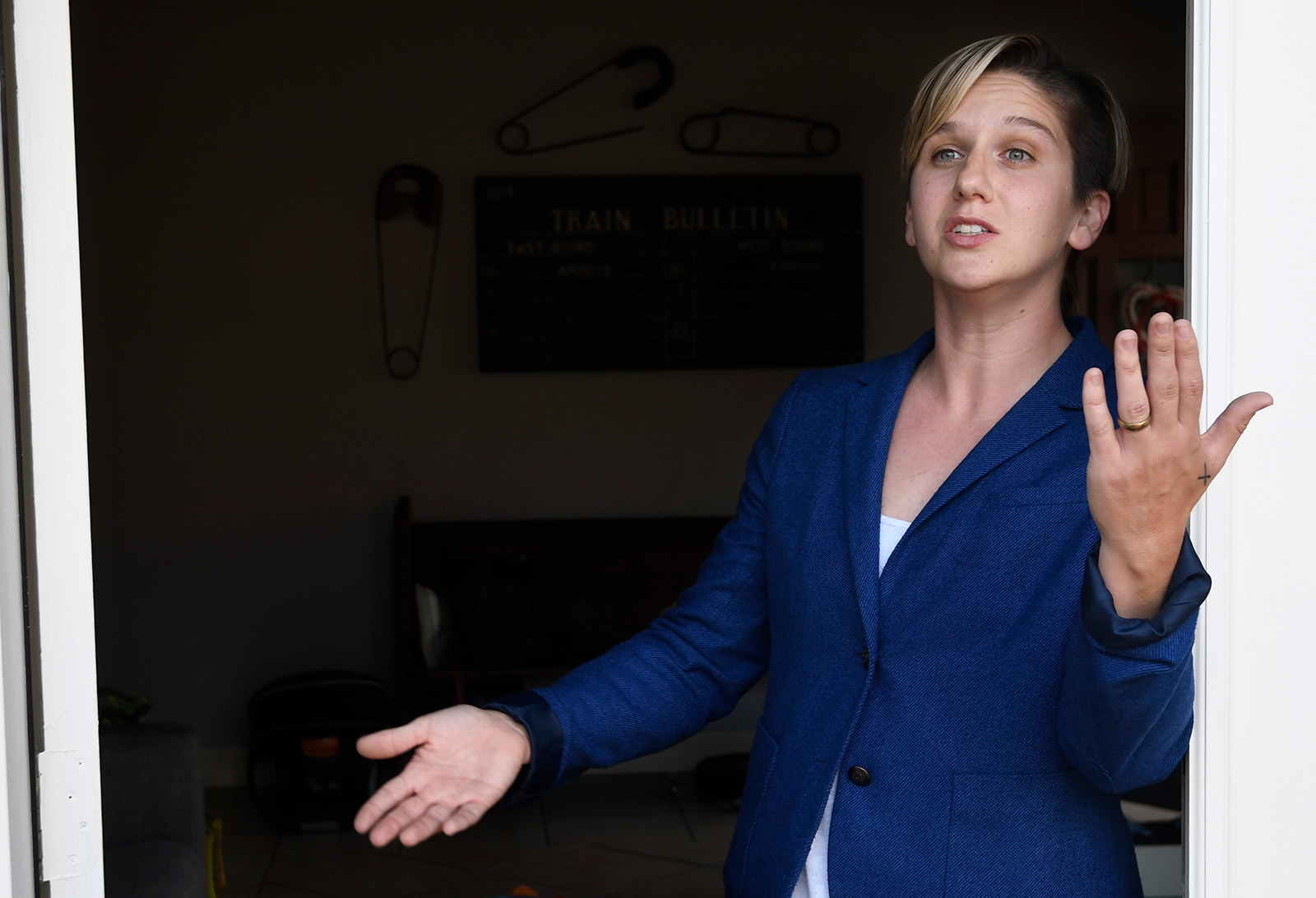Santa Barbara City College Has Its #MeToo Moment
Professor Faces Backlash After Raising Concerns About Guest Lecturer

In the midst of the national #MeToo movement, Santa Barbara City College is grappling with its own crisis of conduct and disclosure after a tenured chemistry professor publicly aired sexual assault allegations against an acclaimed science writer ahead of his scheduled guest lecture on campus. The disclosure triggered legal threats against staff and students and prompted continuing debate around free-speech protections and the rights of the accused.
On the morning of March 19, Professor Raeanne Napoleon sent a campus-wide email that described the evening’s Faculty Colloquium speaker — Dr. Michael Shermer, a monthly columnist for Scientific American and adjunct professor at Chapman University — as “someone who has been accused of sexual harassment and sexual assault (rape) by multiple women.” She linked to a 2014 Buzzfeed article that names and quotes three women who claim to have been victimized by Shermer. “I think it’s important that we understand who tonight’s speaker is,” Napoleon wrote, “so that you can choose whether or not you will support this event.”
The email prompted an immediate flurry of response from faculty and staff. “People with a known history of predatory behavior should absolutely not be invited to speak on college campuses,” wrote student advisor Chelsea Lancaster. “What happened to the principal [sic] of presumption of innocence?” asked Professor Peter Naylor. “[D]on’t contribute to the deluge of misinformation and hate-speech that is destroying our public discourse.” SBCC’s student newspaper, The Channels, published an article that afternoon describing the email exchanges and a decision by event organizers to allow Shermer’s talk on metaphysics and the afterlife to proceed.
The following day, March 20, Shermer issued his own all-campus email through colloquium organizer Professor Mark McIntire. In 10 blistering paragraphs of rebuttal, Shermer called the allegations against him “disgusting, repulsive” lies, and he accused Napoleon of libel and defamation for perpetuating them. “Dr. Napoleon doesn’t know me and doesn’t know anything about me,” he wrote. “And yet she feels no compunction whatsoever to publicly hurl such calumnies against me in an act of wonton irresponsibility.” (Shermer’s full response to the Buzzfeed feature is posted here. In it, he states one of the three reported encounters was consensual and the other two were misconstrued.)

Shermer said it was only last fall that “a moral crusader of Dr. Napoleon’s ilk” notified Chapman University of the Buzzfeed article, and that the college “dismissed” the accusations against him as “unwarranted.” So, too, have his other employers, he said. Shermer admonished the student writer of The Channels article, Daniel Wallace, for not contacting him so he could personally refute the charges. “Any journalist worthy of the name would have called or emailed to ask for a response before publishing a hit piece like this,” he said.
Shermer claimed he could prove damages in lost book sales the night of his lecture. He promised Napoleon and Wallace: “You will pay for it.” Shermer demanded a full retraction of the article from Wallace and a public apology from Napoleon by 6 p.m. the next day or he would take personal legal action against them. His demands were echoed by Professor McIntire, who said while Napoleon had tried to cancel the colloquium, “She succeeded only in fingering herself as a calumniator of the very worst stamp.” Shermer, a Santa Barbara resident, concluded his message with a “final warning” to Napoleon that he would file a restraining order against her if she continued “her defamatory actions going forward by following me around this small community where I live and work and play with my young son.”
The 6 p.m. deadline came and went without Napoleon apologizing or The Channels capitulating. On March 26, in the middle of SBCC’s spring break, Napoleon and The Channels received cease-and-desist letters from Shermer’s Los Angeles attorney. They got a second round of letters on April 4. Napoleon retained her own lawyer after her teachers’ union declined to represent her, and a number of colleagues rallied to her side, creating a GoFundMe page to cover her legal fees. It raised more than $8,000 in a matter of days. Wallace and The Channels consulted with SBCC attorney Joe Sholder, who assured them the article wasn’t libelous. But even if it was, Sholder said, the paper and Wallace were on their own — The Channels’ content is the legal liability of the The Channels Editorial Board, not the college.
A week later, Shermer announced he was dropping his lawsuit. “Although we have an excellent case that I was defamed, it is not worth the time and cost pursuing legal recourse for what is (hopefully) an inconsequential incident,” he wrote in another campus-wide email. Napoleon’s attorney, Melissa Fassett, said Shermer never had a case. For him to prove defamation, he’d have to show that Napoleon’s statements about him were known to be untrue or were made with intentional malice. “Dr. Napoleon had simply voiced concerns about reports accusing Dr. Shermer of misconduct, which had been covered by the press,” Fassett said. “It should be remembered that the First Amendment right to free speech is protected, even if one disagrees with what is said.” Patricia Stark, faculty advisor to The Channels, called the episode a hard-learned lesson for 18- and 19-year-old journalism students. “They stuck to their convictions throughout the ordeal,” she said. “I’m immensely proud of them.”
The author of the Buzzfeed article — Mark Oppenheimer, a regular contributor to the New York Times and the Los Angeles Times — remains fully confident in the accuracy of his reporting. Before it was published, Oppenheimer said, the piece was closely fact-checked, then read and approved by the company attorney. “As you know, we had several women on the record talking about Shermer’s behavior,” he said. “Given women’s understandable reluctance to be named in stories like this, it’s unusual to have multiple on-the-record sources, and yet we did.” Oppenheimer said Shermer sent him a long email after the story was published that described the pain it had caused him. They spoke on the phone as well. “He insisted that the women lied, and I insisted that I stood by my story,” said Oppenheimer. “I still do.”
In an email exchange with the Santa Barbara Independent, Shermer said the entire SBCC issue hinged on a statement made in Napoleon’s email and repeated in Wallace’s article that claimed “police did not bring formal charges against him.” Shermer said law enforcement never investigated the purported incidents. “What police? Where? When?” he asked. “Never in my life have I been investigated by the police — or any law enforcement agency — for anything anytime anywhere.”
Shermer said because Napoleon and Wallace refused repeated requests to retract the statement, his only recourse was through the courts. “The reason I had to draw a line in the sand about this falsehood,” he said, “is because over the many years I have seen these claims grow in falsehoods; e.g., ‘alleged rapist’ became ‘known rapist’ became ‘convicted rapist.’ Convicted!”
[Update, May 14: Stark took issue with Shermer’s version of events. She called his assertion that The Channels resisted writing a correction to a single statement “inaccurate.” “In fact,” Stark explained, “from his first contact with The Channels, Shermer demanded the entire article be removed from the news site. … A ‘takedown’ demand is NOT the same as a request to retract or correct a specific statement, fact or quotation. This is an important distinction, from both a legal and a newspaper staff’s point of view.” Had Shermer asked The Channels to publish a correction to the statement, Stark said, it’s possible the students would have taken different steps. “The Channels, like most news publications, is committed to correcting factual errors and has specific protocols for doing so,” Stark said.]
Though the ordeal left Napoleon badly shaken, with lingering concerns that she was not adequately supported by SBCC administration, she doesn’t regret sending that March 19 email. “In my mind, in 2018, you call this stuff out,” she said. “I don’t think what I did was that brave or out of the ordinary.” If nothing else, she went on, “I just want people to know how this guy operates.” Napoleon recently filed a workplace harassment complaint against McIntire after he continued to criticize her on his public Facebook page and in conversations with students. A student group calling itself STAND formed in response to what it views as the college’s failure to protect Napoleon and The Channels and its enabling silence around the Shermer allegations. Multiple faculty members have voiced similar concerns in departmental and Board of Trustee meetings.
When asked about the Shermer affair and Napoleon’s pending complaint against McIntire, SBCC spokesperson Luz Reyes-Martin said the campus is committed to maintaining a climate free of harassment and has a process in place for investigating any grievances. But “[d]ue to confidentiality standards and ongoing investigations,” she said, “SBCC cannot comment on the specifics of any individual report. However, we can assert that we take these reports very seriously and are diligently following our processes and evaluating all options available to address them.” The college is also now reevaluating the rules around its all-campus email system.



